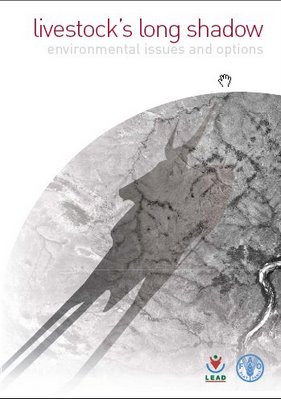 A new report from the United Nations Food and Agriculture Organization (FAO) says that livestock generate more greenhouse gas emissions than transport and are also a major source of land and water degradation.
A new report from the United Nations Food and Agriculture Organization (FAO) says that livestock generate more greenhouse gas emissions than transport and are also a major source of land and water degradation.The livestock sector accounts for 9 percent of CO2 deriving from human-related activities, 65 percent of nitrous oxide, 37 percent of methane and 64 percent of ammonia. Meat and dairy animals now account for about 20 percent of all terrestrial animal biomass.
The FAO report, Livestock’s Long Shadow –Environmental Issues and Options, says “The environmental costs per unit of livestock production must be cut by one half, just to avoid the level of damage worsening beyond its present level”.
This is set against a background of accelerating growth in the agricultural sector in general, and livestock in particular, driven by population pressures and rising standards of living around the world. Global meat production is projected to more than double from 229 million tonnes in 1999/2001 to 465 million tonnes in 2050, while milk output is set to climb from 580 to 1043 million tonnes.
The future is vegetarian.
For the full report, click here.


9 Comments:
Give those cows a PCA card! Failing that, a cork. Can't see many folk turning vegetarian tomorrow on account of the 'long shadow' being cast over their eating habits. Guess we could make cows sacred....worked for the Indians. Best vegetarian food in the world too.
It's not just cows, it's all agricultural livestock. It's not just the animals, it's land use change, it's energy, it's lifestyle changes, it's pollution. It's not a joke, and it's all in the report. Read it.
Yes, I understand all your points. It's just that, Pete, you're a meat eater....
I eat meat about 8 meals a week, which isn't exactly pigging out (no pun intended). I accept that the fact I'm not a complete vegetarian could be used to brand me a hypocrite. However, nobody's perfect! There are many more issues here than eating meat; large numbers of animals are used for transport and as sustainable energy sources. It's conceivable that these animals could be replaced by low- or zero-emission power sources. There are steps that can be taken to reduce per capita emissions from animals; there has been research into diet supplements to limit methane discharge from the gut, for example. I know it's a complex area, but don't trivialise it by emphasising the vege/non-vege dilemna.
From a vegetarian's point of view that is not trivialising it! Anyway, yes there are many issues involved here. Bit late to take it all in right now. Will read the report soon.
NB. Comments below transferred as wrongly posted elsewhere (thanks Keith);
Stephan asked that I put the following on here as he's having blog access difficulty;
'Putting the weight of cows into perspective, here's a quote from Science Daily - www.sciencedaily.com/releases/1998/08/980825080732.htm
'Scientists assume that carbon in the bacteria that live in soil and subsurface takes up about one-half of their dry weight. The team thus found that the total amount of bacterial carbon in the soil and subsurface to be yet another staggering number, 5 X 1017 g or the weight of the United Kingdom..' [is that 5x10^17 g (5x10^11 tonnes)?] anyway, it's lots.
Stephan'
12:29 PM
Pete Smith said...
I wonder how you measure the weight of a country. Does it extend all the way down to the centre of the earth? Does it include the coastal waters?
4:41 PM
I have to say I don't really understand what Stephan's comment is telling us! Another Siberian Timebomb scenario?!
As to your comment Keith; give a cow/goat. These are wondeful selfless presents to which I have enjoyed giving. Trouble is the receivers are not always so understanding!! LOL........
By 'receivers' I mean for example ones family members who receive something from the charity, via one self, telling them that their Xmas present has in fact gone to someone else (e.g. a goat, to an Ethiopian villager). Not always warmly received by the family member!....unfortunately.
Had a quick look at the 'summary & conclusions' section as I am NOT going through a 400 page report (!) and find it interesting that the report reccommends taxing beef because, it has the highest environmental impact as a result of externalities. In other words, they feel that consumption of beef must be reduced to decrease environmental impacts.
They'd be taking on some very powerful business interests. They are probably better off wishing for more BSE outbreaks. Did wonders for recruiting 'white meat only' consumers and vegetarians in the UK last time it happened.
The whole healthy eating trend has surely started to reduce the eating of red meat. Mine you, doesn't the Atkins diet encourage it (wonder if he had links to the US cattle industry!). Can't see milk production going down though.
We know that the growing middle classes of developing countries increase meat consumption and therefore I can't see how major reductions in livestock impacts can be achieved. Humans have a terrible habit of shifting problems around or tinkering at the edges. Take the Netherlands; they move their slurry in trucks from the intensively farmed south to spray it onto fields up north! Only so much can be used in these relatively new power plants that utilize slurry.
Eating habits have to change and population numbers have to drop. Otherwise we are designing ourselves slowly out of existence via environmental degradation or, killing the hand that feeds.
Post a Comment
<< Home